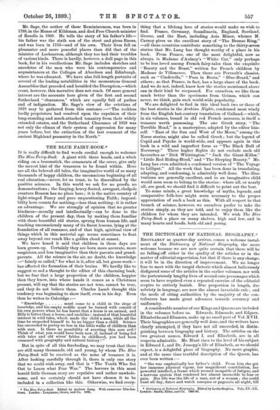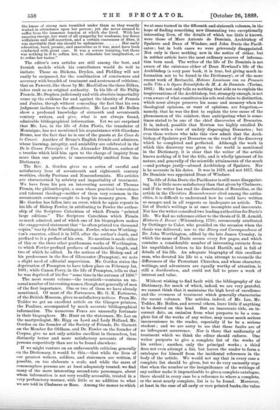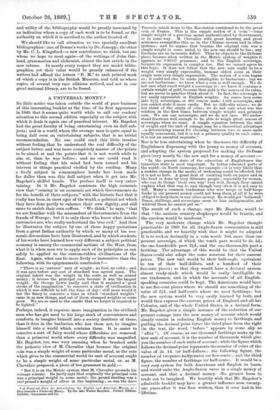THE DICTIONARY OF NATIONAL BIOGRAPHY.*
REGULARLY as quarter-day arrives, comes a welcome instal- ment of the Dictionary of National Biography, the more
welcome because we are now quite certain that there will be no falling-off either in the quality of the articles or in the matter of editorial supervision, but that if there is any change, it will be in the direction of improvement. We no longer fear to meet with the turgid rhetoric which almost ludicrously disfigured some of the articles in the earlier volumes, nor with the portentously lengthy lives of second-rate personages which seem to have required even a repeated exercise of the editorial sceptre to entirely banish. Due proportion in length, due sobriety in language, are now the almost invariable rule ; and the mode of citing authorities by the majority of the con- tributors has made great advances towards accuracy and uniformity.
A considerable number of our Kings and Queens are included in the volumes before us. Edwards, Edmunds, and Edgars, Elizabeths and Eleanore, make up no small part of Vol. XVII. Their biographies are generally well done, and the writers have
clearly attempted, if they have not all succeeded, in distin- guishing between biography and history. The articles on the
two greatest names, Edward I. and Elizabeth, are in all respects admirable. Mr. Hunt rises to the level of his subject in Edward I., and Dr. Jessopp's life of Elizabeth, as we should expect, is a delightful piece of biography. No more graphic, and at the same time truthful description of the Queen, has ever been written :-
" She was emphatically her father's child. From him she got her immense physical vigour, her magnificent constitution, her powerful intellect, a frame which seemed incapable of fatigue, and a nervous system that rendered her almost insensible to fear or pain' . Her life was the life of a man, not of a woman ; she could hunt all day, dance and watch masques or pageants all night, till
• Dictionary of National Biography. Edited by Leslie Stephen. Vols. XV..X.X. London : Smith, Elder, and Co. l888-99.
the knees of strong men trembled under them as they wearily waited in attendance upon her person ; yet she never seemed to suffer from the immense tension at which she lived. With her amazing energy, her want of all sympathy for weakness, her fierce wilfulness and self-assertion, and a certain coarseness of fibre, it was inevitable that she should be unfeminine Her early education, hard, prosaic, and masculine as it was, must have been conducted with great care. It was a severe training, but there was nothing in it to soften her, to stimulate her imagination, or to refine her tastes."
The editor's own articles are still among the best, and furnish models which his contributors would do well to imitate. Those on Dickens, Dryden, and Fielding will not easily be surpassed, for the combination of conciseness and accuracy with breadth of treatment and acuteness of criticism; that on Fawcett, like those by Mr. MacColl on the three Dilkes, takes rank as an original authority. In his life of Sir Philip Francis, Mr. Stephen judiciously and with absolute impartiality sums up the evidence for and against the identity of Francis and Junius, tho'gh without concealing the fact that his own judgment inclines to the affirmative. Mr. Lee and Mr. Bullen show a profound knowledge of sixteenth and seventeenth century writers, and give, what is not always found, admirable bibliographical information. Yet we are surprised that Mr. Lee, in the life of John Florio, the translator of Montaigne, has not mentioned his acquaintance with Giordano Bruno, nor the fact that he is one of the guests at La Cena de la Ceneri. Another of Bruno's English friends and admirers, whose learning, integrity, and amiability are celebrated in the De is Cauca Prineipio if Uno, Alexander Dickson, author of a treatise which laid him open to the charge of impiety from more than one quarter, is unaccountably omitted from the Dictionary.
The Rev. A. Gordon gives us a series of careful and satisfactory lives of seventeenth and eighteenth century worthies, chiefly Puritans and Nonconformists. His articles are characterised by sobriety and impartiality of treatment. We have from his pen an interesting account of Thomas Firmin, the philanthropist, a man whose practical benevolence and tolerant theology—neither of them very common in the seventeenth century—ought to keep his memory green. But Mr. Gordon has fallen into an error, which he again repeats in his life of Bishop Fowler, in attributing to Fowler the author- ship of the Scripture Catechism of which Firmin " printed large editions." The Scripture Catechism which Firmin so much admired, and of which one of his biographers makes the exaggerated statement that " he often printed ten thousand copies," was by John Worthington. Fowler, who was Worthing- ton's executor, edited it in 1673, after the author's death, and prefixed to it a preface of his own. No mention is made either of this or the three other posthumous works of Worthington, to which Fowler prefixed prefaces of considerable length, and two of which he edited. In the notices of the Bishop and of his predecessor in the See of Gloucester (Frampton), we note a slight need of editorial supervision. Mr. Gordon states the deprivation of Frampton to have taken place on February 1st, 1691; while Canon Perry, in the life of Frampton, tells us that he was deprived of his See " some time in the autumn of 1690." The most recent volume—the twentieth—contains an un- usual number of interesting names, though not generally of men of the first importance. One or two of them we have already mentioned. Of most of the Fortescues, Mr. G. K. Fortescue, of the British Museum, gives us satisfactory notices. From Mr.
Tedder we get an excellent article on the Glasgow printers, the Foulises, accompanied by much accurate bibliographinal information. The numerous Foxes are unusually fortunate in their biographers. Mr. Hunt on the statesman, Mr. Lee on the martyrologist, Mr. Rigg on Lord and Lady Holland, Mr. Gordon on the founder of the Society of Friends, Dr. Garnett on the Member for Oldham, and Dr. Fowler on the founder of Corpus, give us not only articles excellent in themselves, but distinctly better and more satisfactory accounts of these persons respectively than are to be found elsewhere.
If we might venture on an unfavourable criticism generally on the Dictionary, it would be this,—that while the lives of our greatest writers, soldiers, and statesmen are written, if possible, on too elaborate a scale, and while the mass of commonplace persons are at least adequately treated, we find many of the more interesting second-rate personages, about whom information is not very readily accessible, treated in a very perfunctory manner, with little or no addition to what we are told in Chalmers or Rose. Among the names to which
we at once turned in the fifteenth and sixteenth volumes, in the hope of finding something new illustrating two exceptionally interesting lives, of the details of which too little is known, were those of Marc Antonio de Dominis, Archbishop of Spalatro and Dean of Windsor, and John Durie the Pacifi- cator; but in both cases we were grievously disappointed. Not only is there nothing new in the notice of either, but in neither article have the most ordinary sources of informa- tion been used. The writer of the life of De Dominis is not aware of the existence either of Dean Newland's life of the Archbishop (a very poor book, it is true, but giving much in- formation not to be found in the Dictionary), or of the more recent work of Bertacchi, Meleore Luminase con an Proentio sulla Vita e le Opere Scientifiche de M. A. de Dominis. (Torino, 1883.) He not only tells us nothing that aids us to explain the tergiversations of the Archbishop, but, strangely enough, is not even aware of what constitutes his sole real claim to distinction, which must always preserve his name and memory when his theological opinions, or want of opinions, are forgotten,— namely, that he was the first to explain the true cause of the phenomenon of the rainbow, thus anticipating what is some- times stated to be one of the chief discoveries of Descartes. It is, indeed, possible that Newton too highly extolled De Dominis with a view of unduly disparaging Descartes ; but even those writers who take this view admit that the Arch- bishop of Spalatro put Descartes on the track of the discovery which he completed and perfected. Although the work in which this discovery was given to the world is mentioned in the Dictionary, it is clear that the writer of the article knows nothing of it but the title, and is wholly ignorant of its nature, and generally of the scientific attainments of the much —and perhaps justly—abused Archbishop of Spalatro. Nor is he accurate in his dates. It was in 1618, and not 1617, that De Dominis was appointed Dean of Windsor.
The life of John Durie the Pacificator is still more disappoint- ing. It is little more satisfactory than that given by Chalmers; and if the writer has read the dissertation of Benzelius, or the article in the Christian Rementbrancer cited among the autho- rities, it is difficult to understand how he could have written so meagre and in all respects so inadequate an article. The list of Durie's writings is at once incomplete and inaccurate. Nor has the writer consulted two leading authorities for Durie's life. We find no reference either to the thesis of G. H. Arnold, Historia 1. Dural (Wittemberg, 1716), erroneously attributed by Oettinger to Coler, who presided on the occasion when the thesis was delivered; nor to the Diary and Correspondence of Dr. John Worthington, edited by the late James Crossley, in which the name of Durie occurs every few pages, and which contains a considerable number of interesting extracts from his unpublished letters to his friend Hartlib, and is full of details of his life. An adequate biography of this excellent man, who devoted his life to a vain attempt to reconcile the differences of the Protestant Churches, and whose character, writings, and adventures are equally worthy of attention, is still a desideratum, and could not fail to prove a work of interest and value.
Without wishing to find fault with the bibliography of the Dictionary, for much of which, indeed, we are very grateful, we cannot think that it maintains the high level of excellence and the evenness of treatment which generally characterise the recent volumes. The articles, indeed, of Mr. Lee, Mr. Tedder, Mr. Bullen, and several others, leave little if anything to be desired on this head. But an inaccurate title, an in- correct date, an omission from what purports to be a com- plete list of the works of any writer, may cause much serious inconvenience to the reader, especially if he be a serious student ; and we are sorry to see that these faults are of no infrequent occurrence. Nor is there that uniformity of treatment which we think the editor should enforce. One writer purports to give a complete list of the works of his author ; another, only the principal works ; a third does not even attempt a list, but leaves the reader to form a catalogue for himself from the incidental references in the body of the article. We would not say that in every case a complete list should be given, but we do very earnestly urge that when the number or the insignificance of the writings of any author make it impracticable to give a complete catalogue, there should in every case be a reference to where a complete, or the most nearly complete, list is to be found. Moreover, at least in the case of all early or rare printed books, the value and utility of the bibliography would be greatly increased by an indication where a copy of each work is to be found, or the authority on which it is ascribed to the author treated of.
We should like to call attention to two specially excellent bibliographies : one, of Donne's works by Dr. Jessopp ; the other by Mr. C. L. Kingsford—a new contributor, we think, but one whom we hope to meet again—of the writings of John Gar- land, grammarian and alchemist, almost the last article in the new volume. In nearly every respect they are model biblio- graphies, yet their value would be greatly enhanced if the writers had affixed the letters "B. M." to each printed work of which a copy is in the British Museum, and told us where copies of several very rare editions noticed, and not in our great national library, are to be found.








































 Previous page
Previous page